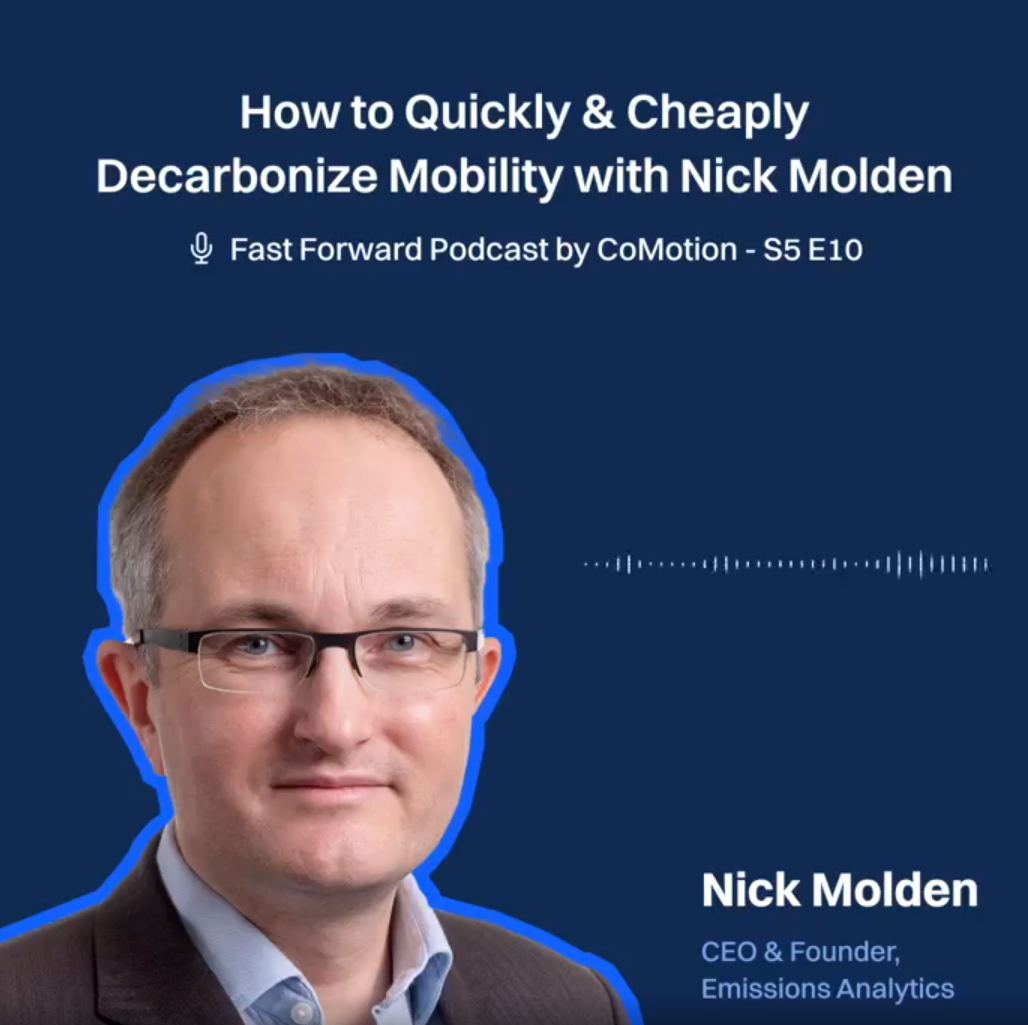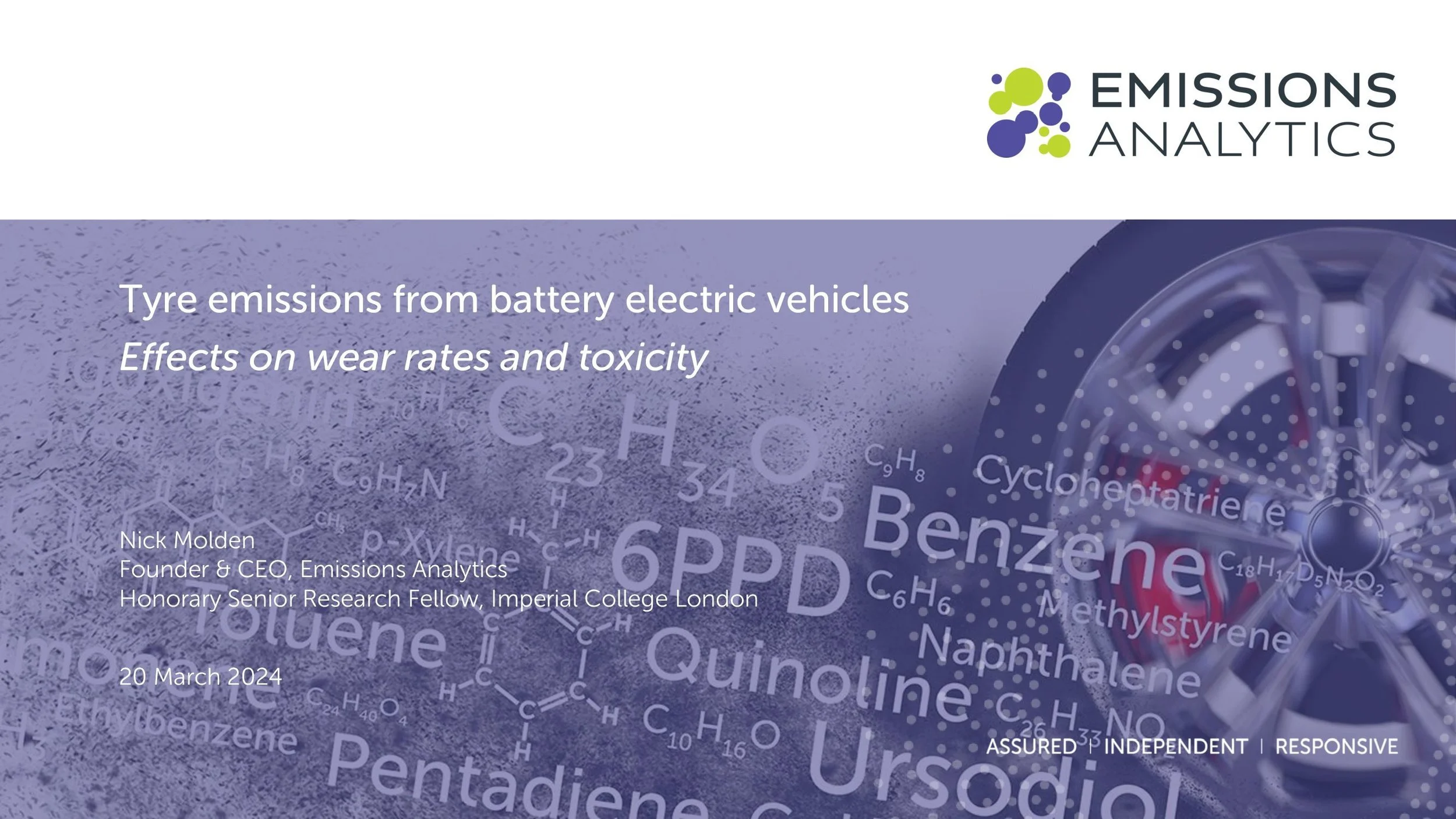Inspired by two recent projects, Emissions Analytics is pleased to announce its support for the launch of a new service to empower citizens in testing their air and water: WHATSINMY?.
New frontiers in understanding tyre emissions: Ultrafines, smog, VOCs and PFAS
Nick explores the latest areas of research on tyre emissions, with a particular focus on tyre wear, ultra-fine particles, and gaseous emissions and dives into the complexities of tyre emissions beyond particle mass, including volatile organic compounds (VOCs) and emerging concerns such as PFAS presence in tyres.
Critical Mass 4: The Politics - Molden & Schmidt Episode 15
We've heard about the big idea - taxing cars by weight and mileage, not engine type. We've looked at the science, the money, and the practicalities? But what about the politics? What could persuade governments to revolutionise the vehicle taxation system? How could this concept overcome the scepticism of the press, public, and politicians who don't like meddling in the costs of driving? Those are the big questions we explore in this final episode of series 2.
You can also listen here…
Spotify
Critical Mass 3: The Money - Molden & Schmidt Episode 14
So how would this radical new system work in practice?
How much would motorists actually pay?
Would petrol still be taxed, too? And could you cheat your way around it?
Those are the questions Nick and Felix set out to answer in episode three of our second series. Their new book - Critical Mass - explores the concept of taxing cars by weight and miles driven, not by type of engine. Oliver's here to 'stress test' their proposition, and see if their answers really stack up.
Critical Mass 2: The Science Molden & Schmidt Episode 13
In the last episode, Nick and Felix pitched their big idea - to tax cars by weight, not type of engine. They say mass is the critical environmental factor, in an electrified world of motoring. But what's the science behind it? Do the sums and formulae add up? That's the subject of this second podcast of series two.
We're joined again by Felix Leach, Associate Professor of Engineering Science at the University of Oxford. He and Nick are the authors of a new book - Critical Mass: The One Thing You Need to Know About Green Cars.
And Oliver's on hand, too - to put Nick and Felix through their paces.
You can also listen here
Reimagining car taxation: a sustainable approach to motoring
Podcast Feature: Building Better with Brandon Bartneck
Tyre emissions: analytical testing of 6PPD and its alternatives, and identifying emerging compounds
Our latest webinar exploring the cutting-edge science behind tyre emissions and the growing concern around 6PPD – a key chemical preservative found in tyres. This session explores the analytical testing processes used to uncover the presence of 6PPD and its alternatives, shedding light on how these compounds impact the environment and what the future holds for tyre manufacturing and sustainability.
Nick Molden on BBC Breakfast – Critical Mass in the Spotlight
The impact of road-tire wear: a hidden source of airborne microplastics and black carbon
Recent studies conducted in the Colorado Rocky Mountains reveal that tire particles, laden with nano-sized carbon black, are being deposited on high-altitude snow, contributing to accelerated melting and atmospheric warming. Analysis by Emissions Analytics identified organic compounds in these particles that match those found in road tires, highlighting their widespread environmental presence.
Emissions experts call for reform of car taxation to be based on a combination of weight and mileage
· Simpler car tax system proposed, based on vehicle weight and miles travelled
· Would apply the ‘polluter pays’ principle
· Switching to 150 kg lighter car or driving 1,000 fewer miles will save £100 a year
· Experts call current VED system ‘a mish-mash of incentives and penalties’
Cars should be taxed on a combination of weight and mileage, according to a radical new study from emissions experts Nick Molden and Felix Leach.
Molden, who is the CEO of emissions testing company, Emissions Analytics, and Leach, Associate Professor of Engineering Science at the University of Oxford, will be launching their new book: Critical Mass: The One Thing You Need to Know About Green Cars at Keble College, Oxford, on November 25th and Imperial College, London, on December 2nd. The events will outline proposals for a simpler, more environmentally-credible road tax system.
The launch of the book will be hosted by Chief Executive of the RAC Foundation and former Director General at the Department for Transport, Steve Gooding, and Professor Gautam Kalghatgi, until recently Visiting Professor at the University of Oxford.
The book outlines in with brutal clarity that the current system for Vehicle Excise Duty (VED) is flawed, even calling it a ‘mishmash of incentives and penalties’.
The result is a powerful evidence-based thinking that has the basis to overcome bitter factional disputes between different groups trying to promote one powertrain over another. Former Secretary of State for the Environment and Deputy Prime Minister, Michael Heseltine, said: “I welcome this contribution to the most important challenge of our time.”
It is a timely release. Next year the so called ‘road tax’ will undergo a major overhaul and it will include Electric Vehicles (EVs) that are currently exempt from VED.
Starting April 1st, 2025, EVs will lose their VED exemption, however. That means buyers of new EVs will have to pay the next lowest first-year tax rate, which currently stands at £10. Once an EV hits its second year on the road, owners will be required to pay the standard VED rate, which is currently £190 and is expected to increase with inflation from April 2025.
The new legislation will also hit buyers of EVs costing over £40k with additional tax and used EV buyers and hybrid buyers will also have to pay more.
But Molden and Leach say there is a solution that is not only better for the environment, but simpler to administer and much easier to understand.
Molden explained: “Taxing a car on a combination of its weight and mileage offers a simple, potentially universal approach to pricing-in the environmental impact of cars while at the same time overcoming the objections to the current mish-mash of incentives and penalties.
“In our book, we offer an intuitive ‘proof’ of why mass and distance are fundamental to designing a system to incentivise the purchase of ever-greener cars and this is contrasted with other flawed bases for judging environmental impact, such as measures of vehicle efficiency, including energy and fuel efficiency, as well as elements incorporated in the current system such as fuel type and laboratory carbon dioxide emissions.”
The two experts outline ways in which the system can be adopted and show the types of cars likely to taxed lightly and those that will be more expensive to keep on the road. Broadly, smaller cars will be cheaper to tax.
Under Molden and Leach’s proposed system (taking the example of the UK) if an average car is 150 kg lighter or does 1,000 fewer miles, the owner would pay £100 less per year.
“Specific tax rates are proposed and compared to existing taxes to illustrate winners and losers – winners being small city cars and loser including high-mileage heavy cars and SUVs,” explained Leach. “The concept proposed is a reliable revenue-raiser at a time of widespread fiscal pressure and declining vehicle taxation. It could also be adopted rapidly and transitioning to it is easy.”
The idea of taxing a car on the basis of its weight and miles travelled, also translates easily for a car-buying public that has to negotiate confusing rates and inconsistencies, while car makers have increased the size and weight of their models with impunity.
Molden added that deploying a single measure of a car’s environmental credentials to guide purchases and government policy is the way forward, and the measure that takes account of approximately three-quarters of the environmental impact of a car is the car’s weight, and that metric correlates well with environmental damage.
Molden added: “Most people want to do the right thing environmentally when they are buying a car, but the information and choices are now too complex for any normal consumer to understand fully. The question was whether there is a simple, practical way to point the car buyer in the right environmental direction and allow governments to tax and subsidise the right things – and there is.”
Ends
Notes to editors:
Nick Molden is the Chief Executive Officer of Emissions Analytics (https://www.emissionsanalytics.com) and a Honorary Senior Research Fellow at Imperial College London
Felix Leach is Associate Professor of Engineering Science at the University of Oxford (https://eng.ox.ac.uk/people/felix-leach/)
Critical Mass: One Thing You Need to Know about Green Cars is now available in hard copy and as an ebook. To obtain a copy go to: https://www.sae.org/publications/books/content/r-575/ or https://amzn.eu/d/2FrpYUH.
To apply for tickets to the launch events, please email info@emissionsanalytics.com.
Kohlendämmerung?
Podcast: Nick Molden joins Chris Caldwell, CEO of United Renewables on his podcast Conversations on Climate change
Molden and Schmidt: the sustainable motoring podcast
Nick Molden, and former Volkswagen executive Oliver Schmidt, have joined forces to confront the thorniest issues facing the industry. The podcast brings together two of the sector's most experienced independent analysts . Their podcast - Molden and Schmidt - is available on Spotify, YouTube, Apple and the Emissions Analytics website.
Podcast: Emissions Analytics featured in CoMotion Postcast
Presentation: Emissions Analytics Tire Technology Expo Presentation 20 March 2024
Why you should be interested in tyres
A surprisingly compelling subject
Dinner table, or social media, conversation may centre on arguments over which football team deserves to win the league, or whether the Mustang or Camaro is better, but the common feature of such polemics is that they represent simple and interesting questions. The topic of tyres, however, and if you dare raise it, may stun your companions into silence. Tyres are not simple and interesting. They are complex and boring – at least on the outside.
Webinar: Tyre emissions from the latest electric vehicles
Our CEO & Founder, Nick Molden presented a webinar on the tyre emissions from the latest electric vehicles on 19th September 2023. The world is on a path to electrifying everything that moves, primarily driven by the desire to decarbonise. But no vehicle is zero emission, and the latest emissions regulations in Europe, the US and beyond are now starting to incorporate non-exhaust emissions.
FUD off
Fear, uncertainty and doubt in an age of decarbonisation
Fear. Uncertainty. Doubt. This rhetorical triptych is increasingly used as an insult to describe interventions from anyone who deviates from the current environmental orthodoxy. When French philosopher René Descartes sat down in the seventeenth century Netherlands to write his Discourse on Method, he also faced FUD.
Cabin fever
In our last newsletter we looked at the unethical challenge set by a high profile academic to see whether you would die if locked inside your garage with an internal combustion engine (ICE) vehicle running.

















